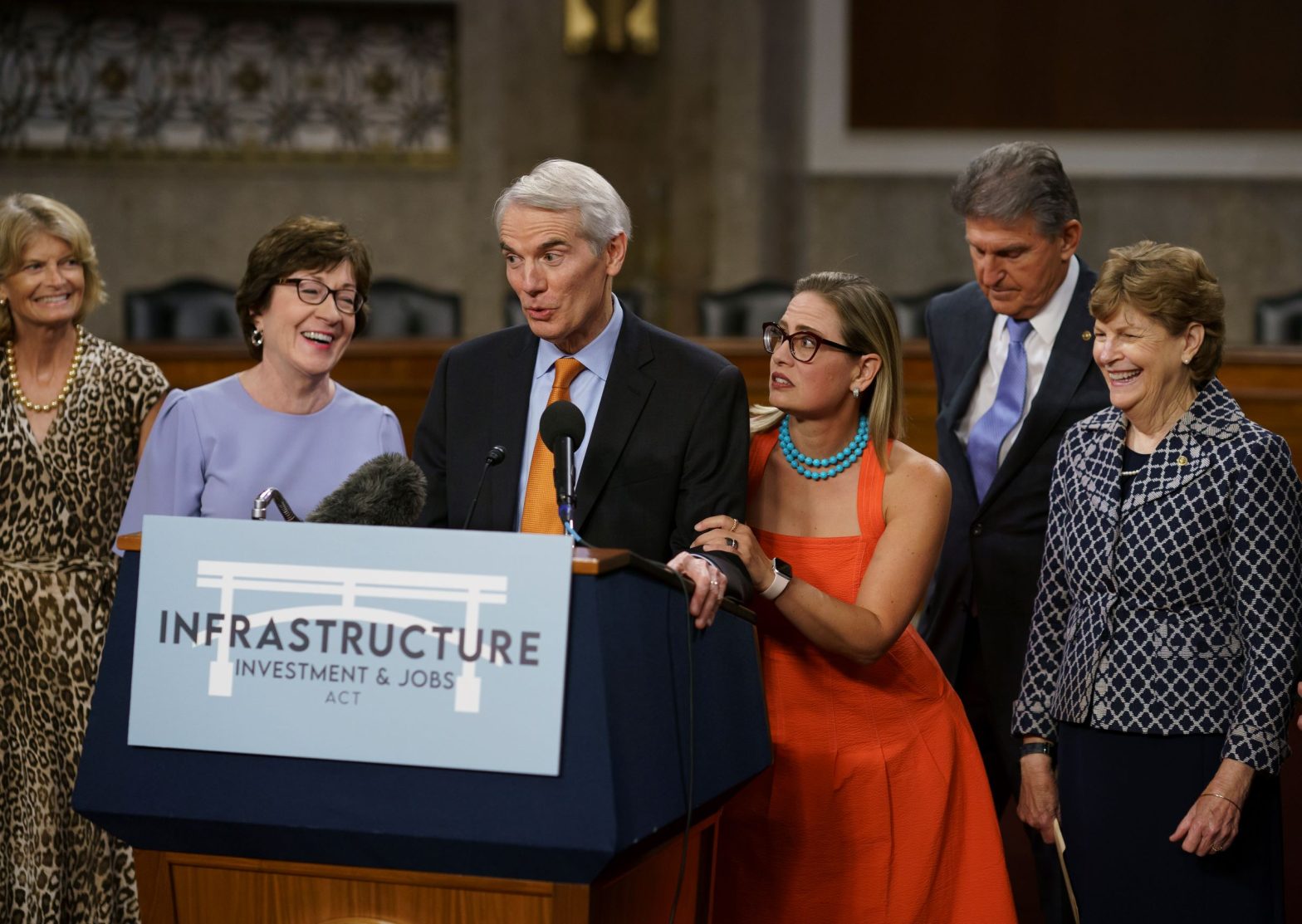Bipartisan Infrastructure Bill Advances in the Senate

WASHINGTON — The U.S. Senate on Wednesday evening voted to advance bipartisan infrastructure legislation, despite the lack of actual bill text to consider and a looming battle in the House over the measure.
By a 67-32 vote, the Senate moved to invoke cloture on a motion to proceed to the legislative vehicle for a bipartisan infrastructure plan with $550 billion in new spending.
Seventeen Republicans, seven more than the 10 needed to end debate and move on to a procedural vote in a 50-50 Senate, joined Democrats and agreed to move forward.
After the vote, Senate Majority Leader Charles Schumer, D-N.Y., quickly commended the bipartisan group of senators who worked with President Joe Biden to hammer out a deal.
“My goal remains to pass both the bipartisan infrastructure bill and a budget resolution this work period,” Schumer said. “Both. It might take some long nights, it might eat into our weekends, but we are going to get the job done. And we are on track.”
Among the Republicans who voted to invoke cloture were members of the bipartisan negotiating team, including Sens. Mitt Romney of Utah, Rob Portman of Ohio, Susan Collins of Maine and Lisa Murkowski of Alaska.
But there were also some surprises in the GOP ranks, including Sens. Lindsey Graham of South Carolina, John Hoeven of North Dakota, Charles Grassley of Iowa, Shelley Moore Capito of West Virginia, and Jim Risch of Idaho.
Even Senate Republican Leader Mitch McConnell voted for the bill, after previously saying that 100% of his focus as leader would be devoted to defeating President Biden’s agenda.
After the vote, Portman, the lead Republican negotiator in the bipartisan group, said “at a time when Washington seems broken, this group of members came together, along with others, and decided we are going to do something great for our country.
“Despite the popularity of it, and the need for it, Washington hasn’t been able to get it done. This time we’re going to get it done,” he said.
Sen. Kyrsten Sinema, D-Ariz., the lead Democratic negotiator in the group, echoed those sentiments, saying negotiators were “deeply committed to demonstrating to the country and to the world that our government can work.”
Sinema went on to thank the senators, on both sides of the aisle, who voted to move forward, saying their support for the measure proved that bipartisanship “is alive and well and works in our country.”
“Several months ago, a group of five Republicans and five Democrats came together to see if we could find a way to find common ground on a true infrastructure bill,” Romney said. “Today’s vote is the culmination of those many months of work, and it represents the way that Washington should work and the way America expects us to work.”
That said, the legislation appears likely to face significant headwinds in the House, where Speaker Nancy Pelosi has vowed not to take it up until after the Senate approves a $3.5 trillion budget reconciliation package that includes many of Biden’s other domestic priorities.
In that respect, she appears to be on the same page as House progressives, who have also gone on record stating they will not vote in favor of one without the other.
“Progressives have been clear from the beginning: a small and narrow bipartisan infrastructure bill does not have a path forward in the House of Representatives unless it has a reconciliation package, with our priorities, alongside it,.” said Rep. Pramila Jayapal, D-Wash., chair of the Congressional Progressive Caucus.
Pelosi is also under considerable pressure from some within the Democratic caucus to ensure that House priorities the Senate didn’t consider are ultimately included in the bill.
“I can’t commit to passing something that I don’t know what it is yet,” Pelosi told reporters Wednesday. “But I’m hoping for the best.”
Paying For It
While the specifics of what’s in the bill may divide members of the House and Senate, it’s not the only issue likely to spark debate as the final text of the bill is written.
Still open to scrutiny is how to pay for it all.
A summary released by the White House Wednesday said the spending would be “financed through a combination of redirecting unspent emergency relief funds, targeted corporate user fees, strengthening tax enforcement when it comes to cryptocurrencies, and other bipartisan measures, in addition to the revenue generated from higher economic growth as a result of the investments.”
At present, the bill uses $205 billion in unused coronavirus aid money as its main source of financing.
Other revenue sources include $53 billion in unused unemployment benefits; $49 billion for delaying a drug rebate rule; $56 billion in expected economic growth (based on a 33% return on investments); $20 billion from sales of future spectrum auctions; and $2.9 billion from extending available interest rate smoothing options for defined benefit pension plans.
Offsets agreed upon by the bipartisan group of senators and the White House include $49 billion stemming from a delay of a Trump-era rule limiting drug manufacturer rebates to pharmacy benefit managers; $8.7 billion from extending statutory sequester cuts to Medicare; and $3 billion from requiring drugmakers to reimburse Medicare for certain wasted medications.
Michael A. Peterson, CEO of the Peter G. Peterson Foundation, a fiscal watchdog group, said he found it encouraging that leaders in the U.S. Senate have reached an historic bipartisan agreement to invest in national infrastructure.
“The ability to work across the aisle to find common ground is an essential part of a functional democracy, and it’s been all too rare in recent years,” Peterson said. “The fact that lawmakers are pursuing ways to pay for their priorities is also an important recognition of our nation’s unsustainable fiscal outlook, and Congress and the administration should ensure that this new spending is fully funded with transparent, credible offsets.”






















